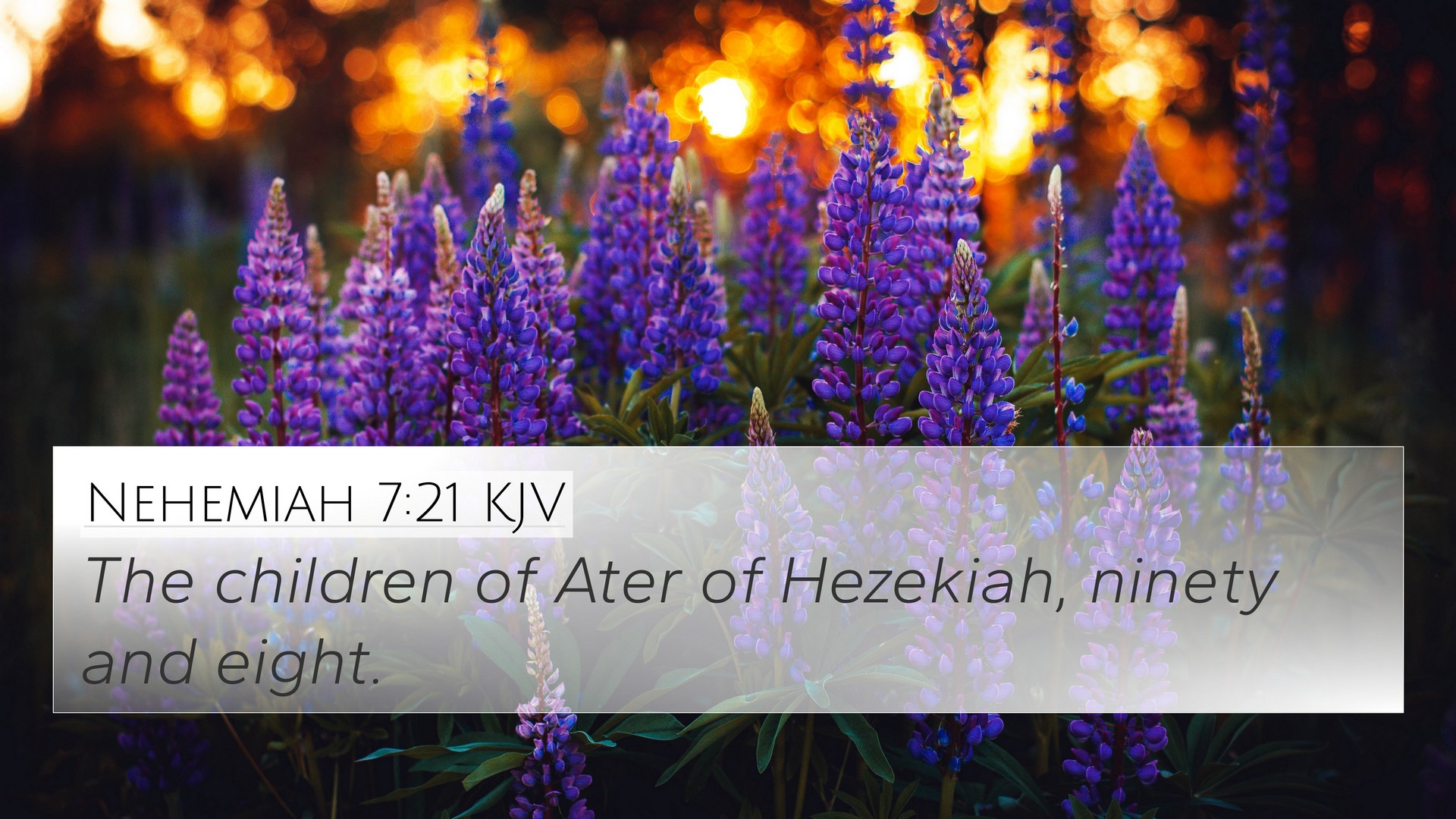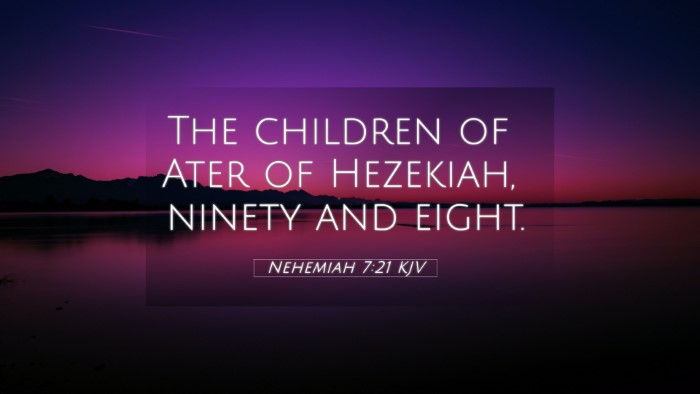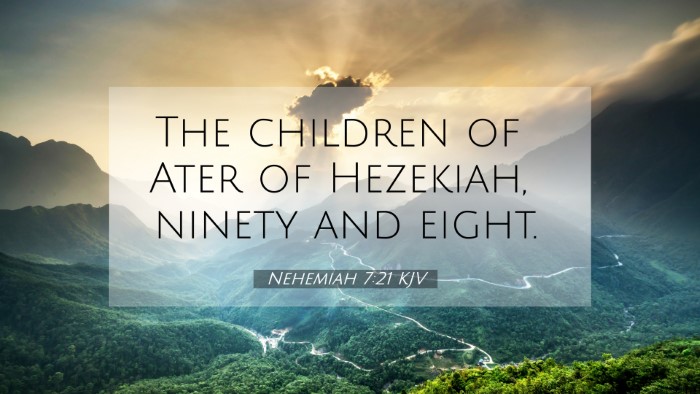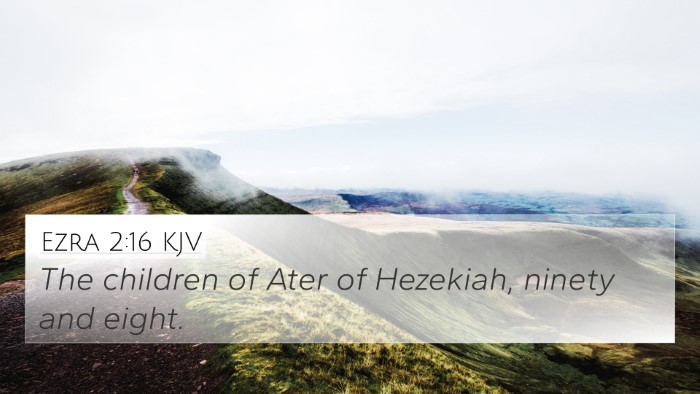Understanding Nehemiah 7:21
Nehemiah 7:21 states: "The priests: the children of Jedaiah, of the house of Jeshua, nine hundred seventy and three." This verse provides a vital statistical account pertinent to the returning exiles of Israel, highlighting the priests who returned to Jerusalem after the Babylonian captivity. The focus here is on the priestly line, underscoring the importance of maintaining holiness and order in worship.
Summary of Themes and Meanings
This verse serves multiple purposes in the broader narrative of Nehemiah and is significant in multiple interpretations:
- Restoration of Worship: The return of specific priestly families parallels the need for proper worship practices, reflecting God’s covenant with His people.
- Significance of Numbers: The enumeration of the priests emphasizes God's faithfulness in preserving a remnant, assuring His people that there are still leaders dedicated to serving Him.
- Covenantal Faithfulness: Mentioning the house of Jeshua connects back to the high priestly lineage, exemplifying a continuity of worship that links back to earlier covenant promises.
Cross-References for Nehemiah 7:21
This verse can be linked to several others throughout Scripture that highlight its themes:
- Ezra 2:36-39: Lists the priests and the significance of their lineage.
- 1 Chronicles 6:49-53: Chronicles the priestly line and their roles.
- Hebrews 7:14: Mentions Jesus as a priest from the line of Judah, contrasting earthly priests.
- Ezra 3:1: Points to the gathering of the people for worship, showing the need for priests.
- Leviticus 21:10-15: Discusses the holiness and the responsibilities of priests.
- Malachi 1:6: Addresses the priests directly regarding their duties and offerings.
- John 4:24: Highlights the importance of true worship, relevant to the role of priests in facilitating worship.
The Priestly Role and Its Importance
The children of Jedaiah are presented with a clear purpose. The priesthood demands holiness and dedication, which is pivotal for the spiritual health of the community. Matthew Henry emphasizes the necessity of maintaining a faithful priestly lineage as they act as mediators between God and the people.
Albert Barnes notes that the specific mention of numbers serves to show that the worship and service of God were being reinstated in a formal and organized manner, a crucial step towards the reestablishment of Jerusalem's religious integrity.
Adam Clarke points out that the return of these priests not only serves a historical record but also illustrates God's providence in a faithful remnant that was to lead the people back to proper worship and adherence to the Law.
Insights from Public Domain Commentaries
According to Matthew Henry's commentary, the attention to genealogical details in Scripture underlines the importance of divine order and acknowledgment of roles within worship. Genealogy in the Bible serves to validate God's faithfulness across generations.
Albert Barnes further elucidates that the record serves as an assurance of continuity in spiritual leadership, reflecting the principle that God preserves His chosen people through various adversities, i.e., from exile back to their homeland.
In Adam Clarke's reading, attention to the numbers serves both as an encouragement and as accountability to ensure that those fulfilling the sacred duties are both faithful and numerous enough to uphold worship in a significant way.
Linking Bible Scriptures
The study of Nehemiah 7:21 invites readers to explore how various Scriptures confirm and enhance one another. The connections between the verses above provide a broader understanding of God's consistent character, the roles of His chosen people, and the methodologies of worship throughout Biblical history. This inter-Biblical dialogue highlights a significant theological thread: the faithfulness of God in utilizing human leaders to maintain His covenant across generations.
Tools and Methods for Cross-Referencing
For those engaged in Bible study, utilizing tools and resources for Bible cross-referencing can significantly enhance understanding. Here are some methods:
- Bible Concordance: Use this tool to find keywords and their occurrences across different passages.
- Bible Cross-Reference Guides: These guides can provide thematic links between verses, enhancing comparative analysis.
- Study Bibles: Many study Bibles include cross-references and footnotes that link related verses.
- Online Bible Study Resources: Websites often provide thematic studies that highlight connections between scriptures.
Conclusion
Nehemiah 7:21 serves as a profound reminder of God's faithfulness in history, particularly through the priestly lineage that upholds temple worship. It is a call to understand the intricate connections between various scriptures, emphasizing the importance of organized worship and the continuation of God's plans through chosen leaders. The insights drawn from commentaries aid in deepening the understanding of these themes, encouraging a comprehensive study of the Bible.



